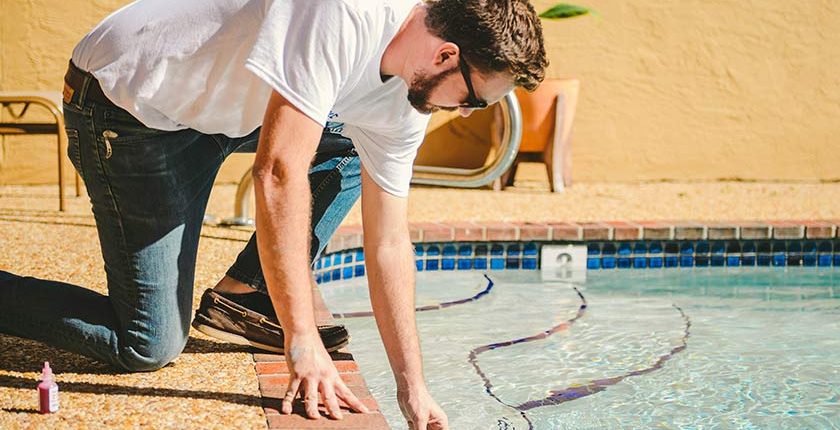Having a pool in your backyard can be a dream come true. Cooling off on a hot summer day, hosting pool parties, and doing laps for exercise are just a few of the joys of pool ownership. However, pools require regular maintenance and upkeep to stay clean, safe, and functioning properly. This is where professional pool inspections come in.
As a homeowner, it’s important to understand what pool inspectors look for during an inspection. Knowing the secrets behind a thorough inspection can help you be an informed pool owner. In this blog post, we’ll explore the inner workings of professional pool inspections to unveil all the details homeowners need to know.
The Importance of Regular Pool Inspections
Most pools require inspection and maintenance several times throughout the swimming season. The frequency depends on factors like pool size, usage and local regulations.
Routine professional inspections are crucial for:
- Safety: Ensuring electrical, gate/barrier and other critical safety systems are functioning properly. An inspection can catch issues early before they become dangerous.
- Sanitation: Checking water chemistry and filtration systems to maintain clean, sanitary water that is safe for swimming. This helps prevent germs and contamination.
- Preventative maintenance: Identifying any needed repairs to equipment like pumps, filters and underwater lights early on. This prevents bigger problems down the road.
- Compliance: Verifying the pool meets local codes and regulations. Some areas require regular inspections by law.
- Energy efficiency: Assessing equipment efficiency and providing tips to maximize energy conservation. Optimizing systems reduces electricity costs.
- Property value: Well-maintained pools add value to a home. Inspection reports provide documentation of a pool’s condition.
Thorough inspections give homeowners peace of mind. Identifying issues early provides time for repairs and helps avoid disruptive, costly emergency fixes later on.
What Does a Pool Inspection Cover?
Pool inspections are comprehensive. All areas and systems are checked to give a complete picture of current pool health and function. While exact inspection scope varies, most cover these key elements:
Pool Structure
The pool shell itself is examined for cracks, damage, leaks and deterioration. Decking, coping and other structures around the pool perimeter are checked for safety and function. Drains and suction fittings are inspected to ensure proper coverings that prevent entrapment. Tile and interior finishes are assessed for damage that could cause cuts or wounds.
Decks and Fencing
Gate latches, fence posts, boundary barriers and other safety measures are reviewed to verify they meet code requirements and are in working order. Decks are evaluated for damage and proper slip resistance.
Electrical Systems
Electrical components like pump motors, wiring, switches, bonds and lights are examined for function, safety and energy efficiency. Some inspectors do in-depth electrical testing.
Plumbing
Pipes, valves, skimmers and returns are checked for leaks and flow function. Hydrostatic valves preventing backflow are tested. Inspectors confirm proper winterization and check for cracks or deterioration.
Water Quality and Filtration
Water balance chemistry, filtration systems, skimmers, pumps and valves are all inspected to evaluate sanitation function. Water circulation and turnover rates are assessed.
Mechanical Systems
Primary focus points include pumps, motors, filter, sweeps, valves and heaters. Inspectors verify adequate function for circulation and heating.
Additional Equipment
Other equipment like salt chlorine generators, covers, cleaners and handrails are examined for proper operation and maintenance needs.
Record Keeping
Documentation like equipment manuals and maintenance logs may be reviewed. Technicians check that system documentation is complete and current.
As you can see, no stone is left unturned during a professional pool inspection. The goal is to provide a complete assessment of all aspects of your pool and related systems.
Step-By-Step: What’s Inspected and How
Now let’s look at what a professional pool inspection entails step-by-step:
Initial Walkthrough
The technician will first do a thorough visual inspection of all areas of the pool and surrounding deck, equipment and safety systems. They will look for any obvious issues or damage.
Structural Integrity Testing
Structural integrity is evaluated through visual assessments and methods like:
- Crack pattern analysis: Identifying crack locations, lengths, widths and propagation can indicate soil settlement, freeze damage or shell integrity issues.
- Tap testing: Tapping the shell and listening for changes in sound can reveal hollow spots behind finishes indicating leaks or delamination.
- Flood testing: Blocking all inlets and raising water level above the tile line eliminates hydrostatic pressure and allows leaks to become apparent.
Water Chemistry and Balance Analysis
Water samples are tested on site for factors like:
- pH: Indicates acidity/alkalinity balance. Must be maintained in the proper range for sanitizer effectiveness and to prevent corrosion or scaling.
- Alkalinity: Provides pH stability and buffering capacity.
- Calcium hardness: Affects corrosiveness. Ideal range helps prevent staining, etching and corrosion.
- Cyanuric acid: Stabilizes chlorine levels and prevents rapid dissipation from UV rays.
- Metals: Such as copper and iron can cause staining and water discoloration if too high.
- Chlorine levels: Need to remain in ideal sanitizing range for safety.
Filtration and Flow Function Tests
Flow rates are measured to ensure proper turnover that achieves sufficient circulation. Pressure differentials check for signs of clogged or inefficient filtration. Circulation pump motors are inspected for function and energy efficiency. Valves, skimmers and baskets are checked for debris obstruction and damage.
Electrical System and Equipment Inspection
Electrical components are inspected for function, proper connections, grounding and bonding. Safety measures like GFCI circuits are tested. All mechanical equipment like pumps, motors and sweeps are evaluated for leaks, performance and signs of wear. Energy efficiency is assessed and any optimization needs noted.
Safety System Audit
Fences, gates, barriers, locks, signage and other safety systems are inspected for compliance and working order. Building codes and state/local laws dictate many requirements. Proper drain covers and fittings are checked.
Auxiliary Equipment Checks
Additional equipment like pool cleaners, salt chlorine generators and covers are tested to verify function and maintenance needs. Heaters, handrails and ladders are checked for damage and safety.
Record Keeping Review
Maintenance logs, operating manuals and warranties are reviewed. Chemical monitoring logs may be assessed for water balance trends. Technicians verify documentation is complete and current.
Visual Inspection Wrap-up
A final visual inspection of all areas assesses if any new issues were revealed during testing. Any leaks or malfunctions observed during the inspection process are noted.
Testing and Analysis Conclusion
Final tests are conducted to conclude the inspection, like total alkalinity and pH verification that systems are stabilized at the end of the process. All testing data is compiled.
Report Preparation
Findings are documented in a detailed inspection report indicating the overall condition, any repairs needed, maintenance notes, safety concerns, code violations, energy efficiency suggestions and more. Photos of issues may be included.
The extensive inspection process leaves no stone unturned regarding your pool’s health and safety. You receive a complete assessment to provide peace of mind.
What Does the Inspection Report Reveal?
The inspection report contains all the nitty gritty details about your pool’s current state. Here are some key things it will reveal:
- Water balance status: Current readings and trends for pH, chlorine, alkalinity and other sanitation factors. Indicates if levels are optimized.
- Filtration effectiveness: Results of turnover rate and flow measurements. Notes any circulation issues.
- Repairs needed: Identifies any leaks, cracks, damage, malfunctions or issues found requiring repair.
- Safety concerns: Lists any code violations or deficiencies with fencing, gates, signage, drains and other safety systems.
- Maintenance needs: Provides maintenance recommendations based on equipment condition and wear and tear noticed. Mentions components nearing end of service life.
- Energy efficiency: Notes any opportunities seen for upgrades like pump motors or sweeps to improve energy conservation.
- Regular service schedule: Recommended schedule for routine services needed to maintain the pool based on size, location and usage.
- Equipment manuals/warranties: List of any manuals or warranties missing from on-site documentation that should be obtained.
- General condition summary: Brief overview of the general condition of all pool structures, decks, equipment and systems.
- Photographs: Pictures detailing any damage, structural cracks, leaks, malfunctions and other issues found.
- Overall inspection summary: Final synopsis of inspection findings and recommendation on if the pool is safe for use or if any repairs are required before further use.
The report gives you a detailed blueprint of your pool’s current status, with all the information needed to address any issues and keep it well-maintained going forward.
Don’t be afraid to dig in with lots of questions – a thorough inspector will be happy to answer them all for you! The inspection is a dialogue and learning opportunity.
Ready for Pool Season with a Professional Inspection
As you can see, professional pool inspectors leave no detail overlooked when assessing your pool. Professional pool inspections examine all structures, systems, equipment and components thoroughly. You gain immense insights into your pool’s current health and how to ensure it remains sparkling and safe for your family’s enjoyment.
Addressing any issues or maintenance needs early on helps avoid big problems later. The inspection gives you essential information to properly care for your pool investment and keep it functioning optimally for years to come. When spring rolls around, a professional inspection helps you open your pool season with full confidence!





